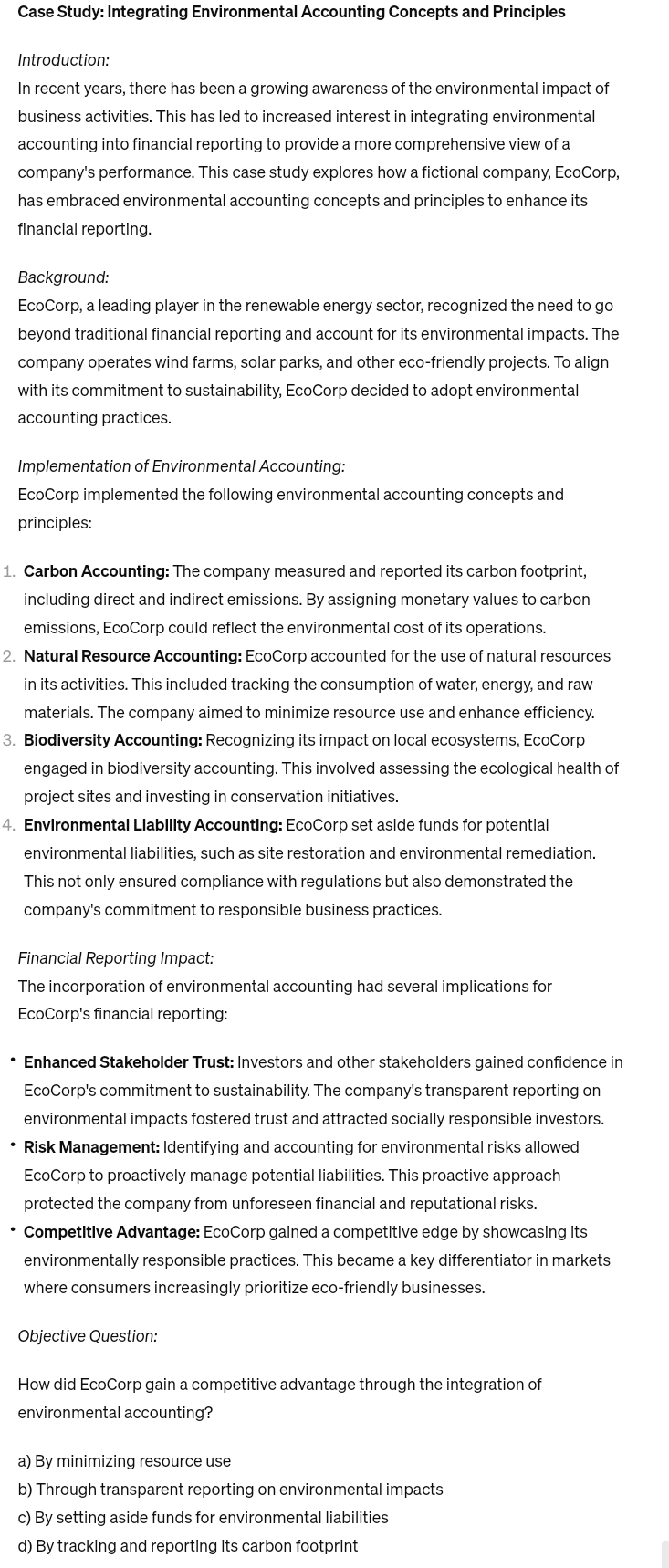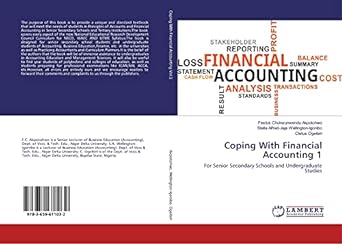Answered step by step
Verified Expert Solution
Question
1 Approved Answer
Case Study: Integrating Environmental Accounting Concepts and Principles Introduction: In recent years, there has been a growing awareness of the environmental impact of business activities.
Case Study: Integrating Environmental Accounting Concepts and Principles
Introduction:
In recent years, there has been a growing awareness of the environmental impact of business activities. This has led to increased interest in integrating environmental accounting into financial reporting to provide a more comprehensive view of a company's performance. This case study explores how a fictional company, EcoCorp, has embraced environmental accounting concepts and principles to enhance its financial reporting.
Background:
EcoCorp, a leading player in the renewable energy sector, recognized the need to go beyond traditional financial reporting and account for its environmental impacts. The company operates wind farms, solar parks, and other ecofriendly projects. To align with its commitment to sustainability, EcoCorp decided to adopt environmental accounting practices.
Implementation of Environmental Accounting:
EcoCorp implemented the following environmental accounting concepts and principles:
Carbon Accounting: The company measured and reported its carbon footprint, including direct and indirect emissions. By assigning monetary values to carbon emissions, EcoCorp could reflect the environmental cost of its operations.
Natural Resource Accounting: EcoCorp accounted for the use of natural resources in its activities. This included tracking the consumption of water, energy, and raw materials. The company aimed to minimize resource use and enhance efficiency.
Biodiversity Accounting: Recognizing its impact on local ecosystems, EcoCorp engaged in biodiversity accounting. This involved assessing the ecological health of project sites and investing in conservation initiatives.
Environmental Liability Accounting: EcoCorp set aside funds for potential environmental liabilities, such as site restoration and environmental remediation. This not only ensured compliance with regulations but also demonstrated the company's commitment to responsible business practices.
Financial Reporting Impact:
The incorporation of environmental accounting had several implications for EcoCorp's financial reporting:
Enhanced Stakeholder Trust: Investors and other stakeholders gained confidence in EcoCorp's commitment to sustainability. The company's transparent reporting on environmental impacts fostered trust and attracted socially responsible investors.
Risk Management: Identifying and accounting for environmental risks allowed EcoCorp to proactively manage potential liabilities. This proactive approach protected the company from unforeseen financial and reputational risks.
Competitive Advantage: EcoCorp gained a competitive edge by showcasing its environmentally responsible practices. This became a key differentiator in markets where consumers increasingly prioritize ecofriendly businesses.
Objective Question:
How did EcoCorp gain a competitive advantage through the integration of environmental accounting?
a By minimizing resource use
b Through transparent reporting on environmental impacts
c By setting aside funds for environmental liabilities
d By tracking and reporting its carbon footprint

Step by Step Solution
There are 3 Steps involved in it
Step: 1

Get Instant Access to Expert-Tailored Solutions
See step-by-step solutions with expert insights and AI powered tools for academic success
Step: 2

Step: 3

Ace Your Homework with AI
Get the answers you need in no time with our AI-driven, step-by-step assistance
Get Started


